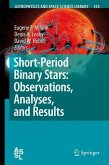The discovery of extrasolar planets has impacted on our understanding of planetary systems. This volume collates research into planets in binary and multistar systems and aims to familiarize readers with its associated theoretical and observational challenges.
In 1988, in an article on the analysis of the measurements of the variations in the radial velocities of a number of stars, Campbell, Walker, and Yang reported an - teresting phenomenon;the radial velocity variations of Cephei seemed to suggest the existence of a Jupiter-like planet around this star. This was a very exciting and, at the same time, very surprising discovery. It was exciting because if true, it would have marked the detection of the ?rst planet outside of our solar system. It was surprising because the planet-hosting star is the primary of a binary system with a separation less than 19 AU, a distance comparable to the planetary distances in our solar system. The moderatelyclose orbit of the stellar companionof Cephei raised questions about the reality of its planet. The skepticism over the interpretation of the results (which was primarily based on the idea that binary star systems with small sepa- tions would not be favorable places for planet formation) became sostrong that in a subsequent paper in 1992, Walker and his colleagues suggested that the planet in the Cephei binary might not be real, and the variations in the radial velocity of this star might have been due to its chromospheric activities.
In 1988, in an article on the analysis of the measurements of the variations in the radial velocities of a number of stars, Campbell, Walker, and Yang reported an - teresting phenomenon;the radial velocity variations of Cephei seemed to suggest the existence of a Jupiter-like planet around this star. This was a very exciting and, at the same time, very surprising discovery. It was exciting because if true, it would have marked the detection of the ?rst planet outside of our solar system. It was surprising because the planet-hosting star is the primary of a binary system with a separation less than 19 AU, a distance comparable to the planetary distances in our solar system. The moderatelyclose orbit of the stellar companionof Cephei raised questions about the reality of its planet. The skepticism over the interpretation of the results (which was primarily based on the idea that binary star systems with small sepa- tions would not be favorable places for planet formation) became sostrong that in a subsequent paper in 1992, Walker and his colleagues suggested that the planet in the Cephei binary might not be real, and the variations in the radial velocity of this star might have been due to its chromospheric activities.
From the reviews:
"Represents an excellent introduction to ongoing research into the existence, formation, evolution and potential habitability of planets in binary and multiple star systems. ... gives a fantastic overview of the newly emerging field. ... chapters themselves each stand alone, meaning that a significant amount of introductory material is covered in each chapter ... . an ideal book for anyone just embarking on research in the field, whether they are observers or theorists, or indeed anyone looking to refresh their understanding of planet formation or detection." (Jonti Horner, Astrobiology Society, August, 2011)
"Represents an excellent introduction to ongoing research into the existence, formation, evolution and potential habitability of planets in binary and multiple star systems. ... gives a fantastic overview of the newly emerging field. ... chapters themselves each stand alone, meaning that a significant amount of introductory material is covered in each chapter ... . an ideal book for anyone just embarking on research in the field, whether they are observers or theorists, or indeed anyone looking to refresh their understanding of planet formation or detection." (Jonti Horner, Astrobiology Society, August, 2011)









